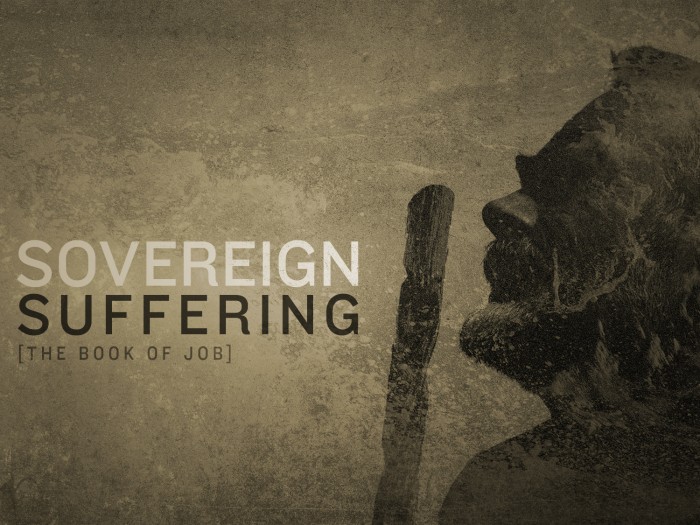The preacher’s mission is to lay hold of perishing men, and by the love of the Redeemer drag them from the pit.
Category Archives: Books
3 Books Every Pastor Should Read: On the Holy Spirit
Books are some of the best friends a pastor can have. How to know which friends to have is quite difficult, for as the inspired Preacher said, “Of making many books there is no end” (Ecclesiastes 12:12). Every so often I recommend three books for pastors on a given topic, hoping the suggestions might inform your book budget.
It’s time I rounded out the Trinitarian scope of book suggestions. Having already recommended some faithful friends on the Trinity, God, and Jesus Christ, it seems quite necessary to think about valuable works on the Holy Spirit.
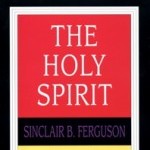 The Holy Spirit by Sinclair Ferguson. Many people in our time refer to the Holy Spirit as the “Forgotten God”, but Ferguson isn’t so sure. He doesn’t doubt the Spirit tends to be neglected, he just thinks a rephrasing of that neglect is in order: “While his work has been recognized, the Spirit himself remains to many Christians an anonymous, faceless aspect of the divine being.” The great man from Scotland give us a portrait of the Spirit’s person and work that is, in a word, “stunning.” He tackles all the pertinent issues with the skill and pastoral wisdom that are now “Fergusonian” hallmarks. If you get only one book on the Spirit, make it this one.
The Holy Spirit by Sinclair Ferguson. Many people in our time refer to the Holy Spirit as the “Forgotten God”, but Ferguson isn’t so sure. He doesn’t doubt the Spirit tends to be neglected, he just thinks a rephrasing of that neglect is in order: “While his work has been recognized, the Spirit himself remains to many Christians an anonymous, faceless aspect of the divine being.” The great man from Scotland give us a portrait of the Spirit’s person and work that is, in a word, “stunning.” He tackles all the pertinent issues with the skill and pastoral wisdom that are now “Fergusonian” hallmarks. If you get only one book on the Spirit, make it this one.
 Holy Spirit: His Gifts and Power by John Owen. I often smirk when I hear people accuse Reformed theology of minimizing the Spirit. I mean, which volumes on the Spirit have been reprinted for centuries? Those written by Reformed authors. You’d be right to employ the adjective of “timeless” to Owen’s work; it’s just that good. Reading the Prince’s original treatise had been a pricy endeavor because you had to buy volume three of his collected works. But Christian Focus did everyone in 2007 a favor by publishing an unabridged, stand alone edition. John Newton called this book, “An epitome, if not the masterpiece of [Owen’s] writings.” Amen. If you want an abridged version you could always pick up the Puritan Paperback from Banner of Truth.
Holy Spirit: His Gifts and Power by John Owen. I often smirk when I hear people accuse Reformed theology of minimizing the Spirit. I mean, which volumes on the Spirit have been reprinted for centuries? Those written by Reformed authors. You’d be right to employ the adjective of “timeless” to Owen’s work; it’s just that good. Reading the Prince’s original treatise had been a pricy endeavor because you had to buy volume three of his collected works. But Christian Focus did everyone in 2007 a favor by publishing an unabridged, stand alone edition. John Newton called this book, “An epitome, if not the masterpiece of [Owen’s] writings.” Amen. If you want an abridged version you could always pick up the Puritan Paperback from Banner of Truth.
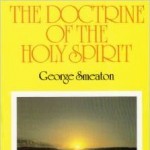 The Doctrine of the Holy Spirit by George Smeaton. What serves as the textbook in Sinclair Ferguson’s “Doctrine of the Holy Spirit” class? Not his own book listed above, nor the work he so loves by Owen. It’s this volume from an outstanding, and forgotten, 19th century Scottish theologian. Originally published in 1899 and brought back by Banner of Truth in 1958, Smeaton’s work is a perfect textbook on the Spirit. He handles his subject under three divisions- he treats first the testimony to the Holy Spirit, as it is progressively revealed in Scripture. Secondly, he gives detailed attention to six subjects: the personality and procession of the Holy Spirit; the work of the Spirit in the anointing of Christ; the work of the Spirit in connection with revelation and inspiration; the Spirit’s regenerating work on the individual; on the Spirit of holiness; and the work of the Holy Spirit in the Church. Finally, there is an historical survey of the doctrine of the Holy Spirit from the Apostolic age. If you’re into e-reading, you can get Smeaton’s work free on Google Books.
The Doctrine of the Holy Spirit by George Smeaton. What serves as the textbook in Sinclair Ferguson’s “Doctrine of the Holy Spirit” class? Not his own book listed above, nor the work he so loves by Owen. It’s this volume from an outstanding, and forgotten, 19th century Scottish theologian. Originally published in 1899 and brought back by Banner of Truth in 1958, Smeaton’s work is a perfect textbook on the Spirit. He handles his subject under three divisions- he treats first the testimony to the Holy Spirit, as it is progressively revealed in Scripture. Secondly, he gives detailed attention to six subjects: the personality and procession of the Holy Spirit; the work of the Spirit in the anointing of Christ; the work of the Spirit in connection with revelation and inspiration; the Spirit’s regenerating work on the individual; on the Spirit of holiness; and the work of the Holy Spirit in the Church. Finally, there is an historical survey of the doctrine of the Holy Spirit from the Apostolic age. If you’re into e-reading, you can get Smeaton’s work free on Google Books.
HONORABLE MENTIONS
Keep in Step with the Spirit: Finding Fullness in Our Walk with God by JI Packer. A brilliant study with an unforgettable controlling metaphor: the Spirit’s ministry as a “Floodlight Ministry.” Read on to find out what the metaphor is all about.
Baptism and Fullness by John Stott. It’s amazing how Stott can so powerfully communicate important doctrines in so few pages. This work on Spirit is as good an introduction as you can find.
Check out my past suggestions in the “3 Books Every Pastor Should Read” series here.
But carry to the pulpit . . . well-digested thoughts, with suitable words to express them – written in your inmost soul, and if needful also in your manuscript – thoughts and words wherewith to stir the souls of your hearers to their inmost depths, – wherewith to hold living conversation with them, and tell them what God has been telling you; and both you and they shall find that the Pulpit still wields a power all together its own.
Recent Reads
I love to read. By God’s grace I am a pretty fast reader; I usually read a couple books each week. I find it helpful to summarize my thoughts on each book and I offer those thoughts in the hope that you will be encouraged to either read or pass over the given title.
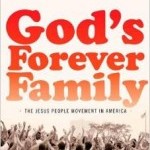 God’s Forever Family: The Jesus People Movement in America by Larry Eskridge. For two and a half years during high school I attended a Calvary Chapel in Sarasota, Florida. It was an utterly unique experience for me; casually dressed pastors preached through books of the Bible and men with guitars led corporate singing that consisted mostly of contemporary songs of praise. It was all very different from my traditional Southern Baptist upbringing. In time I learned how the Calvary Chapel movement descended from Chuck Smith and the Jesus People movement of the late 1960s and early 1970s. So when I saw, late last year, that evangelical historian Larry Eskridge published a book detailing the history and influence of the Jesus People movement I knew I had to read it. God’s Forever Family is book every pastor should consider reading if he wants to better understand the current landscape of evangelicalism.
God’s Forever Family: The Jesus People Movement in America by Larry Eskridge. For two and a half years during high school I attended a Calvary Chapel in Sarasota, Florida. It was an utterly unique experience for me; casually dressed pastors preached through books of the Bible and men with guitars led corporate singing that consisted mostly of contemporary songs of praise. It was all very different from my traditional Southern Baptist upbringing. In time I learned how the Calvary Chapel movement descended from Chuck Smith and the Jesus People movement of the late 1960s and early 1970s. So when I saw, late last year, that evangelical historian Larry Eskridge published a book detailing the history and influence of the Jesus People movement I knew I had to read it. God’s Forever Family is book every pastor should consider reading if he wants to better understand the current landscape of evangelicalism.
Eskridge’s able recounting of the movement’s movers and leaders is fascinating on a historical level. Stories of communes, coffee houses, rock bands, musicals, The Late Great Planet Earth, and hippie Christians make the book interesting even for casual readers. But the huge payoff comes in the final chapter where Eskridge evaluates “The Long-Term Impact of the Jesus People Movement.” He identifies three primary categories of the movement’s long-term impact and influence: music, popular youth culture, and church life. The primary takeaway for today’s pastor is how the Jesus People served as a catalyst for modern evangelicalism’s infatuation with “youth culture.” One reviewer wisely concludes, “When worship looks and sounds like youth group, the church is in danger of being led astray. The church needs youthful energy and boldness, but it also needs the experience and wisdom of older brothers and sisters who find themselves alienated from many evangelical congregations.” Amen. Any pastor would benefit greatly from Eskridge’s excellent work.
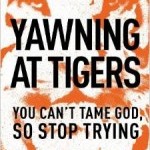 Yawning at Tigers: You Can’t Tame God, So Stop Trying by Drew Dyck. After reading the first three chapters of Yawning at Tigers I was about ready to proclaim it as a modern version of Sproul’s The Holiness of God. Dyck is an excellent writer and his presentation of the Almighty is brilliant. Consider his comments on the scene at Sinai in Exodus:
Yawning at Tigers: You Can’t Tame God, So Stop Trying by Drew Dyck. After reading the first three chapters of Yawning at Tigers I was about ready to proclaim it as a modern version of Sproul’s The Holiness of God. Dyck is an excellent writer and his presentation of the Almighty is brilliant. Consider his comments on the scene at Sinai in Exodus:
[Exodus 19:16-19 is] a powerful scene, one that underscores God’s holiness and majesty. It’s also absolutely terrifying. After such an overwhelming encounter, I wonder if the idea of a mute idol seemed strangely attractive – for comfort if nothing else.
Here the contrast between God and an idol couldn’t be clearer. We’re told that after offering sacrifices to the golden calf, the Israelites ‘sat down to eat and drink and got up to indulge in revelry’ (Ex. 32:6). But when God descended on Mount Sinai ‘everyone in the camp trembled’ (Ex. 19:16). You don’t tremble before an idol.
Now that’s good. Yet, from chapter four on I found Dyck’s argumentation less compelling as he slides into more comfortable evangelical language about God’s holiness and love. Maybe my decreased enthusiasm is his tendency to over-illustrate; at least half the book is anecdotal or illustrative. Or maybe it’s how he can quote John Calvin in one sentence and John Eldridge in the next with equal favor. Don’t get me wrong, the book is solid. I bet my sense of disappoint largely stems from the incredibly high – and probably unrealistic – expectations those first three chapters created.
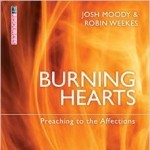 Burning Hearts: Preaching to the Affections by Josh Moody and Robin Weekes. I love books like this one; short volumes that simply address one aspect of faithful proclamation. Moody and Weekes have a burden to see pastors effectively target their congregation’s heart – i.e. affections – in preaching. They define preaching as “the God-ordained means by which He meets with His people through His word and by His Spirit in such a way that His people’s eyes are opened to see Jesus and be captivated by Him” (25). For just over sixty-five pages the authors cover the what, why, and how of preaching to the affections; this is a quick and edifying read. The book’s usefulness is greatly multiplied in the final four chapters where the authors reproduce a sermon manuscript and then comment on its effectiveness in reaching the affections. Carson’s endorsement is a healthy summary, “For some, this will be a healthy reminder; for others, it will revolutionize their preaching.”
Burning Hearts: Preaching to the Affections by Josh Moody and Robin Weekes. I love books like this one; short volumes that simply address one aspect of faithful proclamation. Moody and Weekes have a burden to see pastors effectively target their congregation’s heart – i.e. affections – in preaching. They define preaching as “the God-ordained means by which He meets with His people through His word and by His Spirit in such a way that His people’s eyes are opened to see Jesus and be captivated by Him” (25). For just over sixty-five pages the authors cover the what, why, and how of preaching to the affections; this is a quick and edifying read. The book’s usefulness is greatly multiplied in the final four chapters where the authors reproduce a sermon manuscript and then comment on its effectiveness in reaching the affections. Carson’s endorsement is a healthy summary, “For some, this will be a healthy reminder; for others, it will revolutionize their preaching.”
Click here to find other entries in the Recent Reads series.
Book to Look For: On the Church
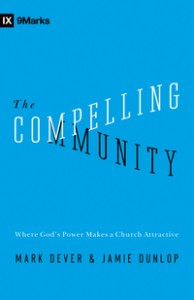 On of my favorite books on ecclesiology is The Deliberate Church by Paul Alexander and Mark Dever.
On of my favorite books on ecclesiology is The Deliberate Church by Paul Alexander and Mark Dever.
I’ve always thought of it as a “Best Of” volume on all things 9Marks, for it presents a sweeping ecclesiological vision on everything from polity, to worship, to running elders meetings. Yet, if The Deliberate Church lacks anything it is extended discussion on the nitty-gritty of a church life together.
Enter The Compelling Community.
A COMPANION FOR THE DELIBERATE CHURCH
Someone told me this forthcoming book by Dever and Jamie Dunlop (an Associate Pastor at Dever’s church) is something of a companion volume to The Deliberate Church. Where the first book constructed a foundation on which the church can stand, this new book seeks to build pillars and buttresses of truth for church life. Here’s what Crossway says:
The local church is meant to embody the vibrant diversity of the global church, transcending racial, cultural, and economic boundaries. Yet local churches too often simply reflect the same societal divisions prevalent in our world today—making them more akin to social clubs filled with like-minded people than the supernatural community the New Testament prescribes. Pastors Mark Dever and Jamie Dunlop argue that authentic fellowship is made up of two crucial ingredients: commitment (depth) and diversity (breadth). Theologically rooted yet extremely practical, this book sets forth basic principles that will help pastors guide their churches toward the compelling community that we all long for.
The Compelling Community is due to land on April 30th.
A Mountain Retreat
Lord willing, tonight after our church’s corporate gathering, my wife and I will head out to Breckenridge, Colorado. It will be our first vacation in over three years.
Our three little boys will remain in Texas with gracious family and friends and so a week of quiet, unhurried time in the Rockies awaits. We couldn’t be more excited.
BOOKS FOR THE MOUNTAINS
The blog will thus be silent until September 22nd. I’m taking a cadre of books, but here are the three I hope to read from cover to cover:1
 God’s Forever Family: The Jesus People Movement in America by Larry Eskridge. The Jesus People movement was a unique combination of the hippie counterculture and evangelical Christianity. It first appeared in the famed “Summer of Love” of 1967, in San Francisco’s Haight-Ashbury district, and spread like wildfire in Southern California and beyond, to cities like Seattle, Atlanta, and Milwaukee. In 1971 the growing movement found its way into the national media spotlight and gained momentum, attracting a huge new following among evangelical church youth, who enthusiastically adopted the Jesus People persona as their own. Within a few years, however, the movement disappeared and was largely forgotten by everyone but those who had filled its ranks.
God’s Forever Family: The Jesus People Movement in America by Larry Eskridge. The Jesus People movement was a unique combination of the hippie counterculture and evangelical Christianity. It first appeared in the famed “Summer of Love” of 1967, in San Francisco’s Haight-Ashbury district, and spread like wildfire in Southern California and beyond, to cities like Seattle, Atlanta, and Milwaukee. In 1971 the growing movement found its way into the national media spotlight and gained momentum, attracting a huge new following among evangelical church youth, who enthusiastically adopted the Jesus People persona as their own. Within a few years, however, the movement disappeared and was largely forgotten by everyone but those who had filled its ranks.
God’s Forever Family argues that the Jesus People movement was one of the most important American religious movements of the second half of the 20th-century. Not only do such new and burgeoning evangelical groups as Calvary Chapel and the Vineyard trace back to the Jesus People, but the movement paved the way for the huge Contemporary Christian Music industry and the rise of “Praise Music” in the nation’s churches. More significantly, it revolutionized evangelicals’ relationship with youth and popular culture. Larry Eskridge makes the case that the Jesus People movement not only helped create a resurgent evangelicalism but must be considered one of the formative powers that shaped American youth in the late 1960s and 1970s.
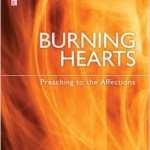 Burning Hearts: Preaching to the Affections by Josh Moody and Robin Weekes. Affection is often a neglected theme in our generation of Bible believing Christians. It has not always been so. Previous generations thought a great deal about the centrality of the heart in the Christian life and the need to preach to it. This book will prove a valuable resource as we learn about the place of the affections in our walk with Christ and in preaching Him to ourselves and others. D.A. Carson says, “For some, this little book will be a healthy reminder; for others, it will revolutionize their preaching.”
Burning Hearts: Preaching to the Affections by Josh Moody and Robin Weekes. Affection is often a neglected theme in our generation of Bible believing Christians. It has not always been so. Previous generations thought a great deal about the centrality of the heart in the Christian life and the need to preach to it. This book will prove a valuable resource as we learn about the place of the affections in our walk with Christ and in preaching Him to ourselves and others. D.A. Carson says, “For some, this little book will be a healthy reminder; for others, it will revolutionize their preaching.”
 Yawning at Tigers: You Can’t Tame God, So Stop Trying by Drew Dyck. When was the last time you were overawed by God’s majesty? Have you ever stood in stunned silence at his holiness and power? In our shallow, self-centered age, things like truth and reverence might seem outdated, lost. Yet we’re restless. And our failed attempts to ease our unrest point to an ancient ache for an experience of the holy. Drew Dyck makes a compelling case that what we seek awaits us in the untamed God of Scripture—a God who is dangerous yet accessible, mysterious yet powerfully present. He is a God who beckons us to see him with a fresh, unfiltered gaze.
Yawning at Tigers: You Can’t Tame God, So Stop Trying by Drew Dyck. When was the last time you were overawed by God’s majesty? Have you ever stood in stunned silence at his holiness and power? In our shallow, self-centered age, things like truth and reverence might seem outdated, lost. Yet we’re restless. And our failed attempts to ease our unrest point to an ancient ache for an experience of the holy. Drew Dyck makes a compelling case that what we seek awaits us in the untamed God of Scripture—a God who is dangerous yet accessible, mysterious yet powerfully present. He is a God who beckons us to see him with a fresh, unfiltered gaze.
——————————————————————————————————————————–
- Book descriptions are taken from the respective publisher. ↩
Recent Reads
I love to read. By God’s grace I am a pretty fast reader; I usually read a couple books each week. I find it helpful to summarize my thoughts on each book and I offer those thoughts in the hope that you will be encouraged to either read or pass over the given title.
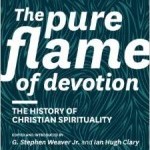 The Pure Flame of Devotion: The History of Christian Spirituality edited by Steve Weaver and Ian Clary. Last fall, on the occasion of his 60th birthday, Dr. Michael Haykin received an honor of which he is most worthy – a feschrift. Now, a feschrift, like any edited volume, is often be a mixed bag. Some chapters are better than others and coherent unity is not always achievable. But I am pleased to tell you The Pure Flame is excellent from beginning to end. The book is broken down into four parts: Patristic & Medieval Spirituality, Reformation & Puritan Spirituality, Evangelicalism & Modern Spirituality, and Baptist Spirituality. These sections not only correspond to a logical flow of church history, but are also linked to Dr. Haykin’s primary areas of expertise. I found every chapter edifying and insightful, but here are a few uniquely applicable to the pastor’s current ministry:
The Pure Flame of Devotion: The History of Christian Spirituality edited by Steve Weaver and Ian Clary. Last fall, on the occasion of his 60th birthday, Dr. Michael Haykin received an honor of which he is most worthy – a feschrift. Now, a feschrift, like any edited volume, is often be a mixed bag. Some chapters are better than others and coherent unity is not always achievable. But I am pleased to tell you The Pure Flame is excellent from beginning to end. The book is broken down into four parts: Patristic & Medieval Spirituality, Reformation & Puritan Spirituality, Evangelicalism & Modern Spirituality, and Baptist Spirituality. These sections not only correspond to a logical flow of church history, but are also linked to Dr. Haykin’s primary areas of expertise. I found every chapter edifying and insightful, but here are a few uniquely applicable to the pastor’s current ministry:
- “Martin Luther: Preaching and Protestant Spirituality” by Carl Trueman
- William Perkins: Application in Preaching” by Erroll Hulse
- “A Resolved Piety: Living in Light of Eternity with Jonathan Edwards” by Peter Beck
- “Benjamin Keach: Cultivating Corporate Spirituality and Church Covenants” by Austin Walker
- “A Gregarious Spirituality: The Personal Piety of Charles H. Spurgeon” by Tom Nettles
The Pure Flame is a fantastic achievement. Well done!
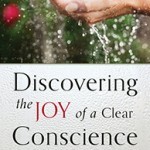 Discovering the Joy of a Clear Conscience by Christopher Ash. When I preached through 1 Timothy last year one of the letter’s striking themes was the importance of a clear conscience for the Christian life. I did some research and really couldn’t find any contemporary books that spoke biblically to the issue of pursuing and keeping a tender, Christlike conscience. Christopher Ash did the same research, noticed a dearth in the field, and decided to write a book about the Christian’s conscience. And my, my – what a book this is! Discovering the Joy of a Clear Conscience is pastoral counseling at its best. Thoroughly rooted in the Bible, centered on the cleansing power of Christ’s gospel, and filled with storied application this book should make its way onto every church’s bookshelf. My only quibble with the work is its cover and title. It may seem tangential, but I’m not sure very many church members would pick up the book, look at it, and then think, “I want to read that!” P&R could, and should, do better. I tip my hat to Ash and hope the second edition gets an aesthetic makeover.
Discovering the Joy of a Clear Conscience by Christopher Ash. When I preached through 1 Timothy last year one of the letter’s striking themes was the importance of a clear conscience for the Christian life. I did some research and really couldn’t find any contemporary books that spoke biblically to the issue of pursuing and keeping a tender, Christlike conscience. Christopher Ash did the same research, noticed a dearth in the field, and decided to write a book about the Christian’s conscience. And my, my – what a book this is! Discovering the Joy of a Clear Conscience is pastoral counseling at its best. Thoroughly rooted in the Bible, centered on the cleansing power of Christ’s gospel, and filled with storied application this book should make its way onto every church’s bookshelf. My only quibble with the work is its cover and title. It may seem tangential, but I’m not sure very many church members would pick up the book, look at it, and then think, “I want to read that!” P&R could, and should, do better. I tip my hat to Ash and hope the second edition gets an aesthetic makeover.
 What is the Gospel? by Greg Gilbert. Just like its subject matter, this little book is a unending treasure trove of useful truth. “Convictional clarity” is the operative phrase for Gilbert’s exposition of that which is of first importance. I’m walking through What is the Gospel? with a potential church member who is a little fuzzy on the good news and Gilbert is a steady guide. The work is ordered around a clear articulate of “God, Man, Christ, Response” and has unique value in its pastoral critique of substitute gospels common in the evangelical world. I’d love to see this little volume become a consistent discipling resource in every church.
What is the Gospel? by Greg Gilbert. Just like its subject matter, this little book is a unending treasure trove of useful truth. “Convictional clarity” is the operative phrase for Gilbert’s exposition of that which is of first importance. I’m walking through What is the Gospel? with a potential church member who is a little fuzzy on the good news and Gilbert is a steady guide. The work is ordered around a clear articulate of “God, Man, Christ, Response” and has unique value in its pastoral critique of substitute gospels common in the evangelical world. I’d love to see this little volume become a consistent discipling resource in every church.
 The Lion, the Witch, and the Wardrobe by CS Lewis. Several weeks ago I decided to read Lewis’ classic tale to my four year old son. I soon realized how much I missed Narnia and so I decided to plow through the short tale in a couple sittings this week. I’ve often said, “If you haven’t read the Chronicles of Narnia, you have yet to live.” After another reading, especially through the eyes of my son, I stand by that statement. Warmth and imagination not only permeate the pages, but the reader’s soul as well.
The Lion, the Witch, and the Wardrobe by CS Lewis. Several weeks ago I decided to read Lewis’ classic tale to my four year old son. I soon realized how much I missed Narnia and so I decided to plow through the short tale in a couple sittings this week. I’ve often said, “If you haven’t read the Chronicles of Narnia, you have yet to live.” After another reading, especially through the eyes of my son, I stand by that statement. Warmth and imagination not only permeate the pages, but the reader’s soul as well.
 Back Channel: A Novel by Stephen Carter. I hadn’t heard of Stephen Carter until I saw Daniel Silva recommend his latest book, Back Channel, as a mighty fine summer read. Because I enjoy Silva’s book and had no reason to suspect his recommendations would fall flat, I picked up Carter’s latest and . . . O, this was fun! Back Channel is, as the publisher says, “a brilliant amalgam of fact and fiction—a suspenseful retelling of the Cuban Missile Crisis, in which the fate of the world rests unexpectedly on the shoulders of a young college student.” Carter vividly captures the horror of nuclear war, the “you can’t trust anyone” nature of Cold War espionage, and the quirks of various politicians and generals presiding over the crisis. I wouldn’t be surprised if readers who know little about those tense days in October 1962 actually take Carter’s tale as fact. He tells it that well.
Back Channel: A Novel by Stephen Carter. I hadn’t heard of Stephen Carter until I saw Daniel Silva recommend his latest book, Back Channel, as a mighty fine summer read. Because I enjoy Silva’s book and had no reason to suspect his recommendations would fall flat, I picked up Carter’s latest and . . . O, this was fun! Back Channel is, as the publisher says, “a brilliant amalgam of fact and fiction—a suspenseful retelling of the Cuban Missile Crisis, in which the fate of the world rests unexpectedly on the shoulders of a young college student.” Carter vividly captures the horror of nuclear war, the “you can’t trust anyone” nature of Cold War espionage, and the quirks of various politicians and generals presiding over the crisis. I wouldn’t be surprised if readers who know little about those tense days in October 1962 actually take Carter’s tale as fact. He tells it that well.
Click here to find other entries in the Recent Reads series.
Book Recommendation: For Pastoral Piety
 Dr. Joel Beeke is the gentle giant of Reformed publishing. He is the editor of Banner of Sovereign Grace Truth, editorial director of Reformation Heritage Books, president of Inheritance Publishers, and vice-president of the Dutch Reformed Translation Society. He has written, co-authored, or edited seventy books, and over 2,000 to Reformed books, journals, periodicals, and encyclopedias.
Dr. Joel Beeke is the gentle giant of Reformed publishing. He is the editor of Banner of Sovereign Grace Truth, editorial director of Reformation Heritage Books, president of Inheritance Publishers, and vice-president of the Dutch Reformed Translation Society. He has written, co-authored, or edited seventy books, and over 2,000 to Reformed books, journals, periodicals, and encyclopedias.
On top of all this Beeke is President of Puritan Reformed Theological Seminary and a pastor at Heritage Netherlands Reformed Congregation in Grand Rapids. I often wonder how the man sleeps!
Today I want to point you to an oft-neglected treasure in The Trove of Beeke: Puritan Reformed Spirituality.
A PERPETUAL NEED
The older I get the more I am convinced, alongside Bonar and M’Cheyne, it’s not great talents God blesses as much as great likeness to Jesus Christ. If local churches are to see revival in our time what we need is ordinary pastors who are passionate about the means of grace and personal holiness. More than visionaries, pioneers, and innovators, the church needs pastors who walk in deep humility, love, and reverence before God.
We thus need, alongside the word and prayer, weapons for our pursuit of godliness. And it’s here that Puritan Reformed Spirituality steps up to the stage.
BIBLICAL SPIRITUALITY DONE RIGHT
In the foreword Beeke says,
The problem with most spirituality today is that it is not closely moored in Scripture and too often degenerates into unbiblical mysticism. In contrast, Reformed Christianity has followed a path of its own, largely determined by its concern to test all things by Scripture and to develop a spiritual life shaped by Scripture’s teachings and directives. Reformed spirituality is the outworking of the conviction that ‘all Scripture is given by inspiration of God, and is profitable for doctrine, for reproof, for correction, for instruction in righteousness’ (2 Tim. 3:16). In dependence upon the Holy Spirit, it aims to achieve what John Murray called ‘intelligent piety,’ wedding scriptural knowledge and heartfelt piety.
Amen. Intelligent piety is our target and Puritan Reformed Spirituality will help you see how spiritual giants of days gone by have aimed for and hit that target’s bull’s-eye.
This book something of a “Best of Beeke” as most of the chapters were previously published in various edited volumes or journals. Therefore, you can read at random and will not lose anything by way of flow or argument. Read all of it, but I’ve found the following chapters unusually challenging:
- “Calvin on Piety”
- “The Puritan Practice of Meditation”
- “The Life and Writings of John Brown of Haddington”
- “Willem Teellinck and The Path of True Godliness“
- “Cultivating Holiness”
- “The Lasting Power of Reformed Experiential Preaching”
In these pages you will also learn at the feet of William Ames, Thomas Boston, the Erskine brothers, Witsius, and Frelinghuysen. Beeke’s book is a model of how to wed historical theology to practical ministry. Tolle lege!
A Series Worth Serious Investment: Vol. 4
A few years ago Joel Beeke and Michael Haykin quietly began editing a series from Reformation Heritage entitled, “Profiles in Reformed Spirituality.” Oh how I wish more people know about this series. Each book is like a stick of dynamite for pastoral piety.
AD FONTES!
In their introduction to the series the editors write,
Charles Dickens’s famous line in A Tale of Two Cities—“It was the best of times, it was the worst of times”— seems well suited to western evangelicalism since the 1960s. On the one hand, these decades have seen much for which to praise God and to rejoice. In His goodness and grace, for instance, Reformed truth is no longer a house under siege. Growing numbers identify themselves theologically with what we hold to be biblical truth, namely, Reformed theology and piety. And yet, as an increasing number of Reformed authors have noted, there are many sectors of the surrounding western evangelicalism that are characterized by great shallowness and a trivialization of the weighty things of God. So much of evangelical worship seems barren. And when it comes to spirituality, there is little evidence of the riches of our heritage as Reformed evangelicals.
As it was at the time of the Reformation, when the watchword was ad fontes—“back to the sources”—so it is now: The way forward is backward. We need to go back to the spiritual heritage of Reformed evangelicalism to find the pathway forward. We cannot live in the past; to attempt to do so would be antiquarianism. But our Reformed forebearers in the faith can teach us much about Christianity, its doctrines, its passions, and its fruit.
SOME WELL-KNOWNS AND LESSER-KNOWNS
One of the series’ greatest assets is how each volume masterfully distills one man’s teaching on and practice of holiness into a bit-size book. In many ways, these titles would be great supplements for morning devotions. There are currently twelve volumes in the series, with more on the way. Here are four titles I’d recommend checking out first; two towering giants of theology and two lesser known, but profoundly gifted pastors.1
 A Sweet Flame: Piety in the Letters of Jonathan Edwards. A Sweet Flame introduces readers to the piety of Jonathan Edwards (1703-1758). Dr. Haykin’s biographical sketch of Edwards captures the importance the New England minister placed on Scripture, family piety, and the church’s reliance upon God. The remainder of the book presents 26 selections from various letters written by Edwards, two written by family members at his death, and an appendix drawing upon Edwards’s last will and the inventor of his estate.
A Sweet Flame: Piety in the Letters of Jonathan Edwards. A Sweet Flame introduces readers to the piety of Jonathan Edwards (1703-1758). Dr. Haykin’s biographical sketch of Edwards captures the importance the New England minister placed on Scripture, family piety, and the church’s reliance upon God. The remainder of the book presents 26 selections from various letters written by Edwards, two written by family members at his death, and an appendix drawing upon Edwards’s last will and the inventor of his estate.
 A Habitual Sight of Him: The Christ-Centered Piety of Thomas Goodwin. Thomas Goodwin (1600–1680) was a faithful pastor, Westminster divine, advisor to Oliver Cromwell, and president of Magdalen College, Oxford. In this book, Joel R. Beeke and Mark Jones acquaint the reader with Goodwin through an informative biographical introduction. The remainder of the book, 35 selections from across the works of Goodwin, displays Goodwin’s constant attention to Christ in his various theological engagements. You will learn much about the life and works of this influential Puritan, and perhaps, be strengthened with a habitual sight of Christ.
A Habitual Sight of Him: The Christ-Centered Piety of Thomas Goodwin. Thomas Goodwin (1600–1680) was a faithful pastor, Westminster divine, advisor to Oliver Cromwell, and president of Magdalen College, Oxford. In this book, Joel R. Beeke and Mark Jones acquaint the reader with Goodwin through an informative biographical introduction. The remainder of the book, 35 selections from across the works of Goodwin, displays Goodwin’s constant attention to Christ in his various theological engagements. You will learn much about the life and works of this influential Puritan, and perhaps, be strengthened with a habitual sight of Christ.
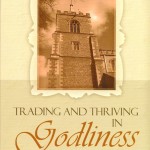 Trading and Thriving in Godliness: The Piety of George Swinnock. George Swinnock (1627–1673) was a gifted English Puritan, known for his vivid illustrations of biblical truth. In “Trading and Thriving in Godliness”, J. Stephen Yuille highlights Swinnock’s conviction that godliness is the primary employment of every Christian. Yuille’s introductory essay analyzes the influences on, groundwork for, and expressions of piety in Swinnock’s life and thought. The book also contains fifty selections from Swinnock’s writings, exemplify his teaching on the foundation, door, value, pursuit, nature, means, and motives to godliness.
Trading and Thriving in Godliness: The Piety of George Swinnock. George Swinnock (1627–1673) was a gifted English Puritan, known for his vivid illustrations of biblical truth. In “Trading and Thriving in Godliness”, J. Stephen Yuille highlights Swinnock’s conviction that godliness is the primary employment of every Christian. Yuille’s introductory essay analyzes the influences on, groundwork for, and expressions of piety in Swinnock’s life and thought. The book also contains fifty selections from Swinnock’s writings, exemplify his teaching on the foundation, door, value, pursuit, nature, means, and motives to godliness.
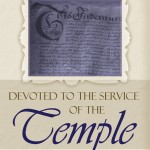 Devoted to the Service of the Temple: Piety, Persecution, and Ministry in the Writings of Hercules Collins. While largely forgotten in modern times, Hercules Collins (1646/1702) was highly influential among the late 17th and early 18th century Calvinistic Baptists of London. Through a biographical sketch and 35 sample selections collected from Collin’s writings, Michael A.G. Haykin and Stee Weaver introduce us to the vibrant spirituality of this colossal figure.
Devoted to the Service of the Temple: Piety, Persecution, and Ministry in the Writings of Hercules Collins. While largely forgotten in modern times, Hercules Collins (1646/1702) was highly influential among the late 17th and early 18th century Calvinistic Baptists of London. Through a biographical sketch and 35 sample selections collected from Collin’s writings, Michael A.G. Haykin and Stee Weaver introduce us to the vibrant spirituality of this colossal figure.
Click here to see previous entries in the “A Series Worth Serious Investment” series.
- Book descriptions taken from the publisher. ↩
Preaching on Job
The advent of a new fall semester often means the advent of a new sermon series for many churches. So it is for us at Imago Dei.
At the end of June we completed a ten-month study of Mark’s gospel, and then took the next eight weeks or so to think specifically about the sufficiency of God’s word for His church. For Psalm 119 says the word is our life, so we considered six ordinary ways – preaching, reading, seeing, supporting, singing, and praying – the life of God’s word resounds into the life of God’s church.
A STUDY FOR OUR SUFFERING
This weekend we begin a study of the book of Job that will, Lord willing, take us right up to Christmas time. A series on Job is no small endeavor. It is a 42-chapter book and one that’s been held in the highest regard by literary scholars for centuries. The Victorian essayist Thomas Carlyle said Job is “the grandest book ever written with pen.” Selections from Job were actually required reading in one of my college English literature classes. The great Reformer John Calvin preached 159 sermons on Job and we are aiming to do it in fourteen weeks! A tall, yet glorious, task awaits.
Over the past few months I’ve told quite a few people that my desire was to preach through Job this fall and the general response has been something like, “Oh. That’s i n t e r e s t i n g.” Meaning, “Are you sure you want to do that?” After much prayer, study, and deliberation I can say, “Yes, I am.” And let me give you two reasons why this book is uniquely valuable for our lives:
- God is sovereign. I am convinced that, outside of the gospel of Jesus Christ and sufficiency of Scripture, precious few truths are as life-transforming as God’s sovereignty over every atom in your body and galaxy in the universe. Job is a book that offers a stunning, if at times uncomfortable, portrait of a God sustaining and governing His creation.
- God’s people suffer. Jesus assumes the Christian life will be one of cross-bearing, Paul announces that everyone who desires to live a godly life will suffer, James says to expect it, and you don’t need to look very far before your eyes will fall on someone enduring pain, hardship, persecution, or trials.
What we need then, and why we turn to Job in these days, is clear and biblical understanding of how God’s sovereignty relates to the suffering of His people. Piper is right to say, “Pain and loss are bitter providences. Who has lived long in this world of woe without weeping, sometimes until the head throbs and there are no more tears to lubricate the convulsing of our amputated love? But O, the folly of trying to lighten the ship of suffering by throwing God’s governance overboard. The very thing the tilting ship needs in the storm is the ballast of God’s good sovereignty, not the unburdening of deep and precious truth. What makes the crush of calamity sufferable is not that God shares our shock, but that his bitter providences are laden with the bounty of love.”1
Our study of Job, Lord willing, will comfort those in our church who are suffering, encourage those who minister to suffers, and prepare us all for future suffering.
COMMENTARIES ON THE SHELF
In case you ever preach through Job here are some commentaries I have used in preparation, force ranked in order of how useful they’ve been so far:
- Christopher Ash – Job: The Wisdom of the Cross in Preaching the Word
- Derek Thomas – The Storm Breaks in Welwyn Commentaries
- Steven Lawson – Job in Holman Old Testament Commentaries
- David J.A. Clines – Job 1-20; Job 21-37 in Word Biblical Commentary
- Elmer Smick – Job in The Expositor’s Bible Commentary
- David Atkinson – The Message of Job The Bible Speaks Today
- David Jackson – Crying Out for Vindication: The Gospel According to Job in The Gospel According to the Old Testament
I can’t wait for this journey to begin. It wouldn’t surprise me if most Mondays this fall find me posting a sermon excerpt from our study in Job. I pray they will be useful meditations for us all.
- Piper, The Misery of Job and The Mercy of God, 9. ↩



